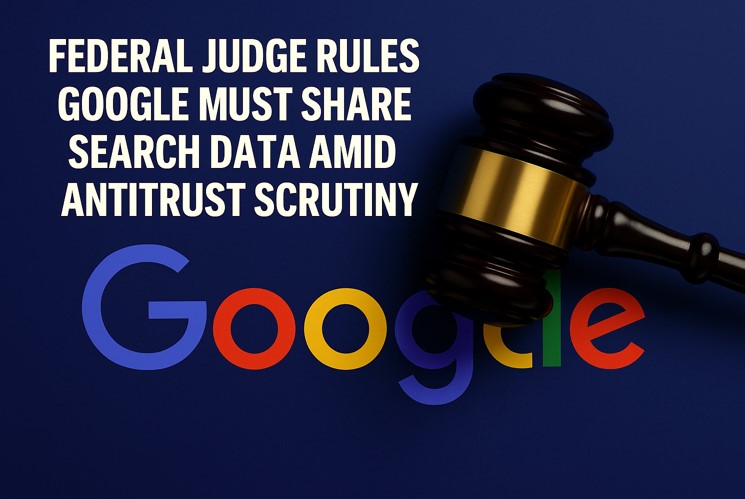San Francisco, CA — In a landmark decision that has sent shockwaves through the tech industry, a federal judge has ruled that Google must provide access to its search engine data to competitors. This ruling comes as part of a significant antitrust case aimed at curbing Google’s monopoly power, though the judge stopped short of breaking up the tech giant. The implications of this ruling could change the landscape for search engines and the broader tech ecosystem dominated by Google.
Judge’s Ruling: A Dual Approach to Monopoly Control
On Tuesday, U.S. District Judge Amit Mehta issued a 226-page ruling that addresses a central concern: Google’s overwhelming influence over online search and related services. As the tech industry evolves—especially with advancements in artificial intelligence and competing search platforms like ChatGPT and Perplexity—the ruling may prove pivotal in leveling the playing field.
In his ruling, Judge Mehta imposed new limitations on some of Google’s strategies that have historically driven traffic to its services. He recognized that Google has garnered significant control over the search engine space, but he also acknowledged that the government’s request to break up the company was excessive. Despite the failure to dismantle Google’s operations, the judge’s decision to mandate the sharing of search data offers a pathway for competitors to enhance their technologies and services.
The U.S. Justice Department has been pursuing this antitrust case against Google for nearly five years. This case centers around the assertion that Google has maintained its monopoly through a series of anti-competitive practices, including multi-billion dollar arrangements that secure its search engine as the default option on various devices—smartphones, laptops, and more. The judge’s ruling challenges some of these practices, albeit falling short of dismantling the existing structure of Google’s market dominance.
Key Takeaways from the Ruling
Judge Mehta’s decision contains a few critical components that deserve attention:
1. Data Sharing Requirement: The ruling mandates that Google must provide its rivals and potential competitors access to key search data that has been accumulated over the years. This data, which stems from trillions of search queries, is vital for improving search algorithms and enhancing service offerings.
2. No Breakup of the Company: The judge dismissed the government’s request for Google to divest its popular Chrome browser—an effort seen as too extreme considering the current market dynamics. By allowing Google to maintain its core offerings, the ruling indirectly affirms the company’s central role in the tech ecosystem.
3. Continued Restrictions on Practices: While Google can continue with its existing arrangements, it must now operate under the constraints imposed by the ruling, which aim to ensure fair competition and limit monopolistic tactics.
The Wider Implications for the Tech Industry
The implications of this ruling are not just significant for Google, but for the entire tech landscape. As artificial intelligence technologies mature and companies like ChatGPT and Perplexity emerge as alternatives to traditional search engines, the competition is expected to intensify. With access to Google’s search data, smaller companies may quickly innovate and improve their own offerings, potentially giving rise to new market leaders.
As per the report by NDTV, the ruling also emphasizes the need for regulatory bodies to carefully scrutinize large tech companies, reinforcing the importance of maintaining a competitive market where consumers benefit from diverse options. The ongoing antitrust actions against Google demonstrate a broader commitment by the government to address monopolistic behaviors in the tech sector.
The Future of Search Engines
The evolving landscape of search engines presents intriguing possibilities. With the rapid integration of AI technologies, traditional search engines may need to rethink their strategies to retain relevance. The rise of ‘answer engines’—which provide direct answers and insights rather than a list of links—poses a direct challenge to Google’s long-standing supremacy in search.
Innovation in search algorithms, backed by newly available data, could lead to enhanced user experiences, more tailored search results, and potentially disruptive changes in how we access information online. As smaller companies gain access to the data that has historically been a closely-guarded secret, the competition is likely to heat up.
What Lies Ahead for Google and Its Rivals
For Google, the ruling signals that it must adapt to a changing regulatory environment while navigating the challenges posed by emerging rivals. The company will need to be proactive in developing its services, ensuring that it does not fall behind in the rapidly evolving technology landscape.
Competitors, on the other hand, now have a unique opportunity to leverage Google’s historical data to innovate and enhance their offerings. The increased competition could ultimately result in better services for consumers, promoting a healthier market environment.
As the tech industry braces for these changes, consumers and businesses alike will be watching closely to see how these developments unfold. The dialogue surrounding the balance between innovation and regulation will continue to shape the conversation around antitrust actions and the role of major players like Google.
In the coming months, stakeholders from various sectors will analyze how the ruling plays out in practice and the eventual impact on the tech ecosystem as a whole.


